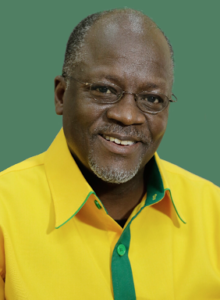President Magufuli ‘Bulldozing’ more than just corruption in Tanzania
Earlier this week, Zitto Kabwe, the leader Tanzanian opposition party ACT-Wazalendo, called on the country’s past presidents to reign in President John Magufuli. Mr. Kabwe, an MP from the Kigoma region, says he is appealing to respected elders and national figures to “warn President Magufuli that he is fomenting hatred and disunity that could lead to the disintegration of the nation.”

President Magufuli of the ruling Chama cha Mapinduzi (CCM) Party took office in November of 2015. Nicknamed the “Bulldozer” for his strong public works record and commitment to his projects, Magufuli’s campaign platform centered on tackling government corruption. His popularity swelled when he cancelled expensive independence day celebrations in December, just weeks after his election, and encouraged citizens to come together and clean the streets instead. These measures even won him the support of members of the opposition, including Kabwe himself.
Magufuli has also become popular among the donor community and international organizations such as the IMF. Over the last five years, Tanzania’s funding from the international community has fallen due to concerns about the government’s failure to act against corruption.
At the time of last year’s election, Kabwe openly supported Magufuli for his strong anti-corruption platform. Kabwe remarked, “We have built strong opposition based on a grand corruption agenda. Now we have a president who has decided to join us in this crusade. Why should we oppose him?”
Much of Magufuli’s action to root out corruption revolves around firing corrupt officials. In December, he sacked the Permanent Secretary for Transportation and other top officials at the Tanzanian Port Authority, as well as Anti-Corruption Chief Edward Hoseah.
In January, Tanzania’s new information minister announced a permanent ban on Mawio, a weekly-printed Kiswahili-language newspaper for “inflammatory” reporting. Days later, the Tanzania Communications Regulatory Authority (TCRA) announced a three-month suspension of six television and 21 radio stations if they failed to pay license fees. Fifteen of the radio stations and one of the television stations paid their dues a day later, but the incident is noteworthy for its implications.
Data from the Tanzania National Panel Survey shows that increased media consumption is associated with greater levels of political participation. Similarly, when Tanzanians watch more television, their approval of national politicians starts to fall. Magufuli’s move in the name of anti-corruption has undertones of an attempt to impede government transparency.
In addition, there is reason to believe Magufuli’s popularity will soon begin to fall. If Magufuli continues to berate civil servants, he risks losing the support of the many teachers, nurses, and other government administrators nationwide who feel scapegoated by his accusations of laziness, dishonesty, and incompetence. Furthermore, as he fires his highest government officials, he will lose their loyalty and likely the support of their political allies. In doing so, he runs the risk of fomenting friction within the government and inhibiting its functionality.
Kabwe is one such disenchanted official. CCM spokesperson Christopher ole Sendeka said of Kabwe, “[He] is bitter because some of his associates have been purged from government…”
While Magufuli’s leadership has yet to generate any crises, Kabwe warns that economic troubles are on the horizon. According to Kabwe, statistics released by the Bank of Tanzania show “a downward trend in growth” since Magufuli took office, with GDP falling by four percent in the first six months of his term.
As Magufuli shuts out his political opponents, he also shuts out their concerns and the facts on which they are based. If Magufuli continues to suppress his opposition in the name of stamping out corruption, he alienates his colleagues as well as citizens nationwide. Tanzanians should be cautious of what their “Bulldozer” knocks down–transparency, cooperation, freedom of opinion–in the name of building up.
